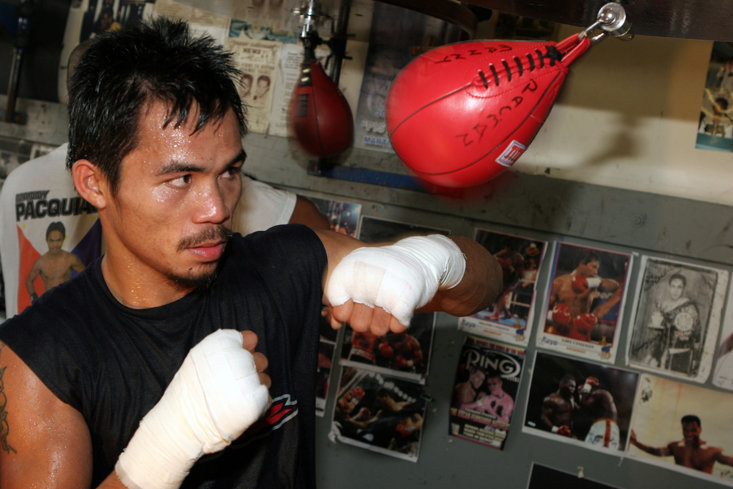“I knew without a doubt I would become a fighter – I knew that the underdog can, and often does, win.”
When James ‘Buster’ Douglas stunned Mike Tyson in Tokyo almost 30 years ago, the impact of the infamous heavyweight classic was felt almost worldwide and just under 2,000 miles away from the Japanese capital, the fight’s shocking outcome had just influenced a future boxing great to commit his life to the ring – the story of Manny Pacquiao was just about to begin.
It’s crazy to think that had a 42/1 underdog in Douglas not stopped the seemingly invincible Tyson on that cool February night, the young man from the Phillipines might never have pursued a career in boxing, and we could have been robbed of one of the sport’s greatest students.
Born in Kibawe in 1978 into immense poverty, Pacquiao and his family were so poor they’d often be unable to even afford basic provisions such as rice. Living with his parents, two brothers and sister in a tiny single-room shack, the future world champion, who would go on to generate approximately 19.6 million in pay-per-view buys and $1.2 billion in revenue, wouldn’t even lay his eyes on a TV set until he was ten.
The hunger became so unbearable for the Pacquiao family that at one point his father was forced to kill their pet dog for food.
When Pacquiao began to box seriously, he made the decision to drop out of school and move in with his uncle Sardo Mejia in a one-storey home in the southern Philippine city of General Santos. Mejia, a boxing fanatic, would become Manny’s first trainer and introduction into the world of prizefighting.
Pacquiao later wrote in his autobiography: “Even though he had no formal training, we both took it seriously and knew that we were going to be champions one day.”
By 15 he was regarded as one of the best junior boxers in the country and often fought from an open-air park in General Santos, taking on anyone who dared face him and beating all with relative ease.
The hard work and sacrifice would pay off and a year later, Pacquiao turned professional and the rest, as they say, is history.

From a poverty-stricken school drop-out, Manny Pacquiao has carved out a 24-year-old career that has seen him become an eight-weight world champion, lineal champion in five different weight classes, and claim wins against such names as Marco Antonio Barrera, Erik Morales, Juan Manuel Marquez, Oscar De La Hoya, Ricky Hatton, Miguel Cotto, Joshua Clottey, Antonio Margarito, Shane Mosley, Brandon Rios, Timothy Bradley, Lucas Matthysse, Adrien Broner and, most recently, Keith Thurman among many, many others.
Now retired, Pacquiao still occasionally surfaces in exhibition bouts. The competitive fire never truly having gone out for the boxing superstar. To this day there is a talk of an exhibition rematch against Floyd Mayweather.
Until then, Pacquiao’s rags-to-riches story continues to inspire millions around the globe, especially in his native Philippines, and his tale will no doubt encourage waves of future fighters for generations to come. There’ll never be another Manny Pacquiao.
News
OMG! LUCY TORRES NAGSAMPA NG KAS0 LABAN KAY RICHARD GOMEZ AT DAWN ZULUETA!
Isang malaking balita ang umusbong sa mundo ng showbiz matapos ang pagsampa ng kaso ni Lucy Torres laban sa kanyang asawa na si Richard Gomez at aktres na si Dawn Zulueta. Ang insidenteng ito ay nagdulot ng gulo at tensyon…
DAWN ZULUETA EMOSYONAL NA ISINAPUBLIKO ANG ANAK NILA NI RICHARD GOMEZ!
Isang napaka-emosyonal na sandali ang nangyari sa mundo ng showbiz nang si Dawn Zulueta ay lumantad at isinapubliko ang kanyang anak na si Cassie, ang kanilang anak ni Richard Gomez. Ang pagbabahagi niya ng mga detalye tungkol kay Cassie ay…
MILO BRAND MAS TUMAAS ang SALES SIMULA ng PALITAN ni EJ Obiena si Carlos Yulo Bilang ENDORSER!
Isang malaking balita ang umikot sa mundo ng sports at marketing nang ilabas ng Milo ang kanilang bagong endorser na si EJ Obiena, kasunod ng pagpalit kay Carlos Yulo. Ang desisyon na ito ay agad na nagbunga ng positibong resulta,…
Netizens, ibo-boycott umano ang isang mall dahil sa pagbibigay ng gift card kay Carlos Yulo
Disappointed netizens vowed to boycott the shopping mall chain after they expressed their support to two-time Olympic gold medalist Carlos Yulo. This week, Carlos visited the headquarters of the said mall at Pasay City, where he received a gift check…
REAKSYON ni SYLVIA Sanchez sa PAGBUBUNTIS ng ANAK na si RIA Atayde!
Ang aktres na si Sylvia Sanchez ay hindi na bago sa pagiging bukas at tapat tungkol sa kanyang pamilya. Kamakailan, naging tampok ang reaksyon ng ina nang ibalita ng kanyang anak na si Ria Atayde ang pagbubuntis nito. Isang malaking…
JUST IN! Sylvia Sanchez TINUTULAN ang PAGBABALIKAN nila Arjo Atayde at Sue Ramirez! Maine NAGBUNYI!
Nagulantang ang mga tagahanga ng showbiz nang maglabasan ang mga balita tungkol sa posibleng pagbabalikan nina Arjo Atayde at Sue Ramirez, dalawang kilalang personalidad sa industriya. Ang kuwento ay mabilis na kumalat matapos magbigay ng pahayag si Sylvia Sanchez, ina…
End of content
No more pages to load











